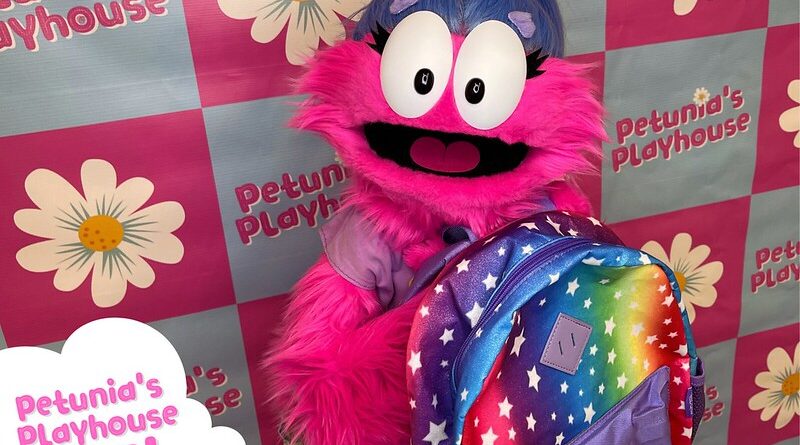INTERVIEW: ‘Petunia’s Playhouse’ promotes message of self-care for kids
Photo: Petunia, performed by Laura Kay Clark, is moving from her web series to the New Ohio Theatre. Photo courtesy of press rep / Provided with permission.
The new musical Petunia’s Playhouse Live!: Petunia’s Big Day is a fun-filled puppet adventure that will soon set up shop at the New Ohio Theatre in the West Village of Manhattan. The show is meant to be enjoyed by families and audience members of many ages, and it’s takeaway message is crucial: Self-care is important for children to consider, especially during a pandemic when feelings of isolation are exacerbated by staying indoors and quarantining.
In the musical, which kicks off Dec. 22 and runs through Jan. 1, the characters are pulled from the beloved web series of the same name. Petunia, of course, is at the center of the narrative, and she is joined by Pumpkin Duck. Together they overcome many mental health challenges, and they introduce the audience to various strategies that can help with understanding one’s feelings, maintaining a positive attitude and fostering resilience, according to press notes. Looking to spoil Petunia’s first day at school is the character of the Anxiety Monster.
Laura Kay Clark wears many hats for the show. She is not only the creator and writer, but she also plays Petunia, a role she played on the web series, too. Billy Recca provides original songs for the musical, and Christina Rose Ashby directs.
Recently Hollywood Soapbox exchanged emails with Clark, whose previous credits include I Kissed Your Boyfriend: Another Feminist Rant and the film Wide Eyed. Questions and answers have been slightly edited for style.
Did the pandemic inspire this new play?
In many respects, yes. The original web series was very much inspired by the pandemic — I saw an opportunity to create content that would help families cope with our new reality. All of a sudden, our lives had changed so quickly. I really wanted to create content that uplifted and empowered people to take care of themselves. Even now, our lives are constantly shaped and influenced by the pandemic, so creating content specifically geared toward mental health seems particularly relevant.
Are the live show and the web series completely different mountains to climb?
Yes! The live show has so many more elements — a cast, a live audience, a full set, a creative team and brand-new music! The show is much more involved than the web series, but it’s a mountain I’m no longer climbing alone, which is an incredible feeling. When I created the first season of the web series, I was completely on my own in quarantine — it wasn’t safe to collaborate with others in person, so I was essentially the cast, crew, designer, director, editor, everything. I really enjoyed doing that work and creating the series, but it was in many ways limiting in terms of what I could create at that time. I’m grateful now to be climbing this live show mountain with a team of dedicated artists who are all invested in telling this story and expanding on the world of Petunia’s Playhouse in a new, meaningful way.
How important is it to broach the topic of mental health with children?
It’s essential. Children need a healthy framework where they can express and explore their feelings, and put a name to them. I think if we can normalize topics surrounding mental health and self-care, kids can grow up with more self-awareness and take more of an interest in their overall wellness. Equipping them with the tools and language to do so can only benefit them.
As a playwright, how do you ensure these topics and concepts are being received and understood by a younger crowd?
I try to present these concepts and topics in a bright, engaging manner that makes self-care seem fun and exciting. In my work it’s really important that I don’t talk down to my audience — children are very smart and intuitive. Petunia takes on the role of a trusted friend and guide, someone who can share experiences with them and make self-care seem really enticing. I also really believe in the importance of supplemental programming and materials, which is why we’re working with a licensed mental health professional on this show to create free worksheets, resources and activities for audiences that they can do at home after seeing the show.
How does puppetry help children be educated and entertained?
Puppets have an absolutely magical quality. I think we’ve proven time and time again with long-running, puppet-centric family programming that there’s just something so special about these characters. Using puppetry gives us an opportunity to create engaging characters that spark imagination — it’s almost like seeing a cartoon come to life. If I were to get onstage as myself, I don’t think it would have the same effect. Petunia is colorful, she’s cute, she’s universal.
Why is there still a stigma about mental health?
This is a tough question. I think often in our society, mental illness gets equated with weakness, and self-care/mental health practices get equated with selfishness or narcissism. Neither is true. There’s a real hesitancy when talking about our feelings — as children and adults — and I think that’s ultimately really damaging. Some of it can be attributed to lack of access to mental health resources, and in our country especially, we are a culture that glorifies burnout and the “grind.” There are many contributing factors I think, but the pandemic has brought a lot of these issues to the forefront. And we’re all starting to collectively address them.
By John Soltes / Publisher / John@HollywoodSoapbox.com
Petunia’s Playhouse Live!: Petunia’s Big Day plays Dec. 22 to Jan. 1 at the New Ohio Theatre in the West Village of Manhattan. The show is presented by New Ohio Theatre for Young Minds and Party Claw Productions. Click here for more information and tickets.

